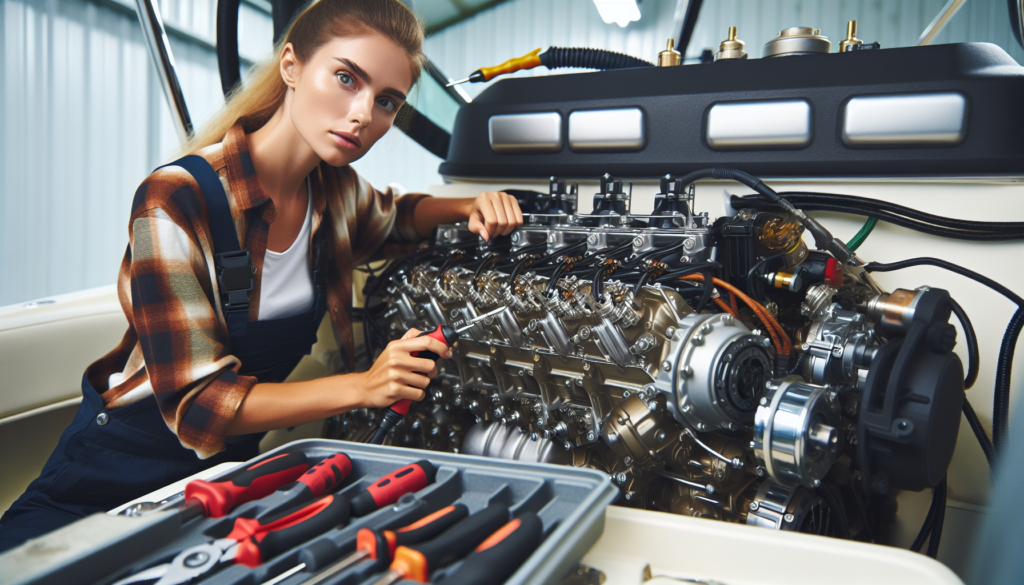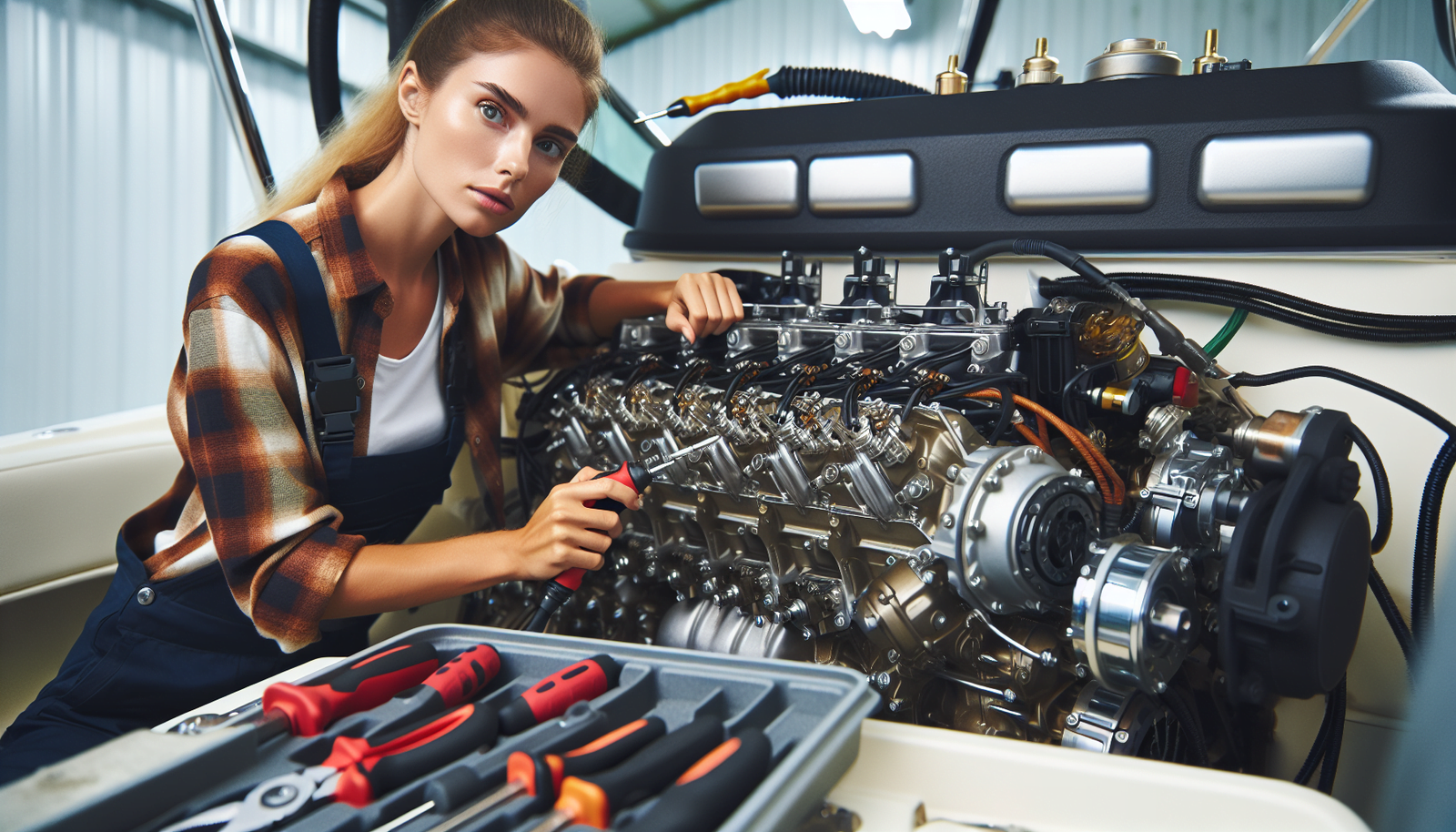Your recreational boat is more than just a vehicle for fun and adventure—it’s an investment. To keep it running smoothly and extend its lifespan, there are some essential maintenance tasks to undertake. “Essential Maintenance Tasks for Recreational Boat Engines” is a comprehensive guide that covers everything from fuel system upkeep to propeller inspections, helping you keep your boat’s engine in tip-top shape. So, brace yourself for a journey through the intricacies of boat engine maintenance, as this article seeks to equip you with knowledge and tips to maintain your precious possession.
Understanding Your Boat’s Engine System
When it comes to enjoying your time out on the water, understanding your boat’s engine system is crucial. Without an efficiently operating engine, your seaward adventure can quickly turn into a nightmare. Engaging with the system allows you to properly maintain it and identify potential issues before they become severe.
Basics of boat engine system
The boat engine system may appear complicated at first glance, but it actually operates on very fundamental principles. It comprises different components that work in harmony to generate power and allow smooth movement. It includes the engine that burns fuel to produce power, the transmission system that transfers this power to the propeller, and the exhaust system that discards waste gases.
Types of boat engines
There are essentially two types of engines that power most boats: Outboard and Inboard engines. Outboard motors are self-contained units, including engine, gearbox, and propeller, that hang off the back of a boat. Inboard engines, on the other hand, are built into the boat and feature a drive system often called the ‘stern drive’ or ‘inboard outboard’. Both types have their own merits depending on the type of boat and the intended use.
Key components of the engine system
Your boat’s engine system is made up of key components including the engine itself, the fuel system, the cooling system, and the lubrication system. The system also includes the battery, alternator, and starter which make up the electrical system, and the propeller, which transforms power into motion.
Routine Engine Inspection
Engine inspections, both visual and more thorough, are essential to ensure that your boat’s engine stays in top shape. Regularly scheduled checks will keep you ahead of any potential problems.
Importance of regular engine checks
Carrying out regular engine checks can save you from unexpected failures and expensive repairs. These checks give you an opportunity to catch any issues early and may flesh out any parts that are worn out and need replacement.
Visual engine inspection
A visual inspection is a quick and easy way to identify any obvious issues. Look for signs of any leaks, frayed wires or damaged hoses. Check if any parts are loose or missing, and look at the overall cleanliness of the engine compartment. The condition of the engine can tell you a lot about its health.
Detecting discrepancies
If during your check you notice a difference in the engine noise or smell, these could be potential signs of an underlying issue. Other discrepancies to watch out for include overheating, change in engine performance like misfires, or increased fuel consumption.

Engine Oil Maintenance
Just like the heart needs blood, your engine needs oil. Oil lubricates the moving parts of your engine, reduces friction and helps in heat dissipation.
Significance of proper oil levels
Having insufficient oil in your engine can cause serious damage. It will cause the engine components to rub together and create heat, leading to possible engine seizure. On the other hand, too much oil isn’t good either. It may get whipped into a froth by the moving parts which reduces its ability to lubricate and could actually lead to more engine heat.
Checking engine oil levels
To check the oil level, first ensure the boat is level. Remove the dipstick, wipe it clean, then reinsert it fully. Pull it back out and check the oil level against the markings. This should be done regularly, ideally before every outing.
How frequently to change engine oil
Changing your boat’s engine oil is a task that should be completed periodically, usually every 100 hours of operation or annually, whichever comes first. However, this frequency might change based on the manufacturer’s recommendations, so it’s important to check your owner’s manual.
Type of oil suitable for boat engines
For most boats, marine grade oil is recommended as it is formulated to work in a marine environment. Boat engines often operate under higher load and RPMs than car engines, so they need that extra bit of protection that marine grade oil provides.
Fuel System Care
A smooth-running fuel system is what keeps the food supply to your engine going in the right amounts and at the right time.
Recognizing a healthy fuel system
A healthy fuel system delivers a steady and clean supply of fuel from the tank to the engine. If your boat starts easily, accelerates smoothly, and doesn’t stall, then your fuel system is likely in good condition.
Cleaning and maintaining the fuel tank
Over time, fuel tanks can accumulate water and other contaminants. The water can cause corrosion while the contaminants can clog your fuel lines and filters. Therefore, it’s important to occasionally add a fuel treatment to clean and stabilize the fuel. Make sure to keep your fuel tanks filled to avoid condensation.
Changing the fuel filter
The fuel filter is crucial in keeping dirt, debris and other contaminants from getting into your engine. Signs that you might need to replace the fuel filter include difficulty starting the engine, poor performance or a decrease in fuel efficiency. This task should be done at least once every boating season.

Cooling System Check-up
The cooling system of a boat prevents the engine from overheating by circulating coolant around the engine block.
Understanding the role of the cooling system
Heat is one of the leading causes of engine failure in boats, and the cooling system is the primary defense against it. An efficient cooling system not only keeps your engine running at the optimal temperature but also extends its longevity.
Checking coolant level
You can check the coolant level in the overflow tank. If the coolant is below the “minimum” mark, add coolant to bring it to the “maximum” mark.
When to replace coolant
The coolant should be replaced as per manufacturer’s recommendations, typically every one to two years. If the coolant looks cloudy or has debris floating in it, it’s time for a change.
Drive Belt Inspection and Maintenance
The drive belt plays a critical role in the operation of many parts of your engine.
Function of the drive belt
The drive belt, also known as the serpentine belt, powers several peripheral devices in your engine such as the alternator, water pump, and power steering pump. An effective drive belt is vital for the overall health of your engine.
Examining for wear and tear
It’s important to regularly inspect your drive belt for signs of wear and tear. Some common indicators include cracks, splits, or shiny or glazed appearance on the belt. Excessive noise from the engine could also signify a slipping belt.
Replacing the drive belt
If the belt shows any signs of wear or damage, or if it’s been a while since it was last replaced, it may be time to fit a new one. It’s recommended to replace drive belts every 3-5 years or as per manufacturer’s guidance.
Battery Maintenance
A working battery is key to starting your boat’s engine.
Importance of a healthy battery
Without a healthy battery, your boat might not start, or worse, you might find yourself stranded. The battery also powers all of your boat’s electronics which ensures a safe and smooth journey.
Checking for corrosion
The battery terminals should be checked regularly for signs of corrosion. Corrosion can lead to impaired electrical connections, making it harder for the battery to deliver the current your engine needs.
Charging and replacing batteries
A battery should be charged when it’s below 50% or after a lot of engine starts. You can use a reliable battery charger suited for marine batteries. On average, boat batteries need to be replaced every 3-5 years.
Propeller Maintenance
A propeller, in simple terms, is what moves your boat through the water.
Role of the propeller
As your engine creates power, the propeller converts that power into thrust by moving water. The propeller’s condition has a direct impact on the boat’s performance and efficiency.
Checking for damages
Regularly examine your propeller for any signs of damage. Even small dings or bends can cause vibration, which over time can lead to damage to other parts of the engine.
Properly cleaning the propeller
After every outing, give your propeller a thorough clean to remove any damaging salt and debris. At least once a year, remove the propeller entirely to check for any wrapped fishing line, as this can cause a leak in the gear case seals.
Spark Plug Care
In an engine’s combustion cycle, spark plugs are what ignite the fuel.
Significance of spark plugs
Spark plugs play a key role in burning the air-fuel mixture inside the cylinders. Damaged or dirty spark plugs may result in wasted fuel, misfires, and poor performance.
Inspecting spark plugs
Regularly inspect the plugs for any deposits, burns, or wear. An oily spark plug may indicate a problem in the cylinder while a dry, white appearance could mean an overheated plug or an incorrect spark plug heat range.
Cleaning and replacing spark plugs
You can clean minor deposits on the plug with a wire brush and plug cleaner. However, heavy deposits, cracked insulators, or worn electrodes call for a replacement. As a general rule, spark plugs should be replaced every 100 hours of operation.
Involving a Professional
While you can perform many regular maintenance tasks yourself, there are certain situations when you should bring in a professional.
When to bring in a professional
Sometimes, despite your best efforts, your boat’s engine may still exhibit problems. If you’ve gone through your list of checks and can’t find anything wrong, or if the engine is experiencing recurring issues, it’s time to bring in a professional.
Choosing the right marine mechanic
The right marine mechanic will have experience working with the type of boat you have. Look for mechanics who have marine certifications and a good reputation in your boating community. Ask them questions about their experience and how they would approach resolving your engine issues.
Understanding what services will be performed
When you enlist the services of a mechanic, make sure you understand what tasks will be performed. A reputable mechanic will explain what work will be done and provide an accurate cost estimation. Also, ask them to explain any maintenance needs that you could handle yourself in the future.

